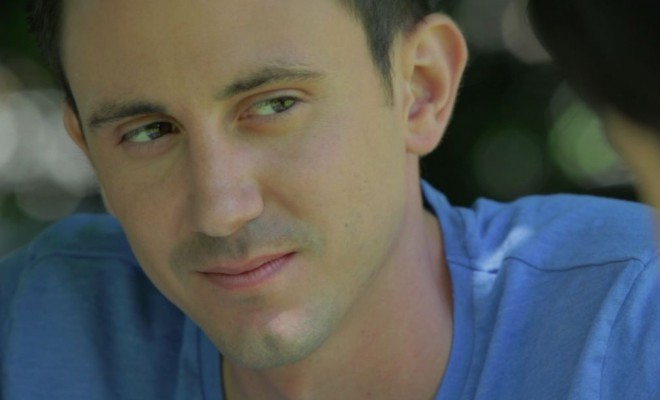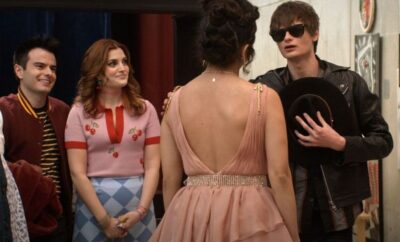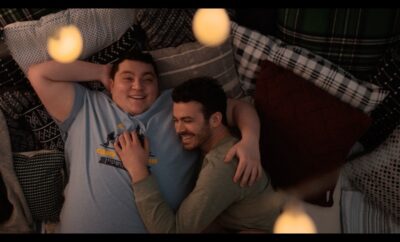
Interviews
Kyle T. Cowan – Camouflage
Q) What are the recent projects that you are working on?
A) Recently, I have mainly been focused on getting my book published and auditioning for roles. Over the summer, I played Young Frank Winter on WGN America’s show “Manhattan,” which was an awesome experience.
Q) Talk about the evolution of creating your film Camouflage and now seeing it in film festivals.
A) The entire Camouflage experience was great. I learned a ton and got to work with some extremely talented people. I would say the coolest part of the evolution process was seeing how the film came together in the end. The sequencing of the scenes in the final product is very different from the way the script is written. It was a lot of work. We shot the film in thirteen days on a shoestring budget and edited the film with minimal funds. I am excited to see it at Open Wound Film Festival next weekend and even more excited to see what people think of the film on November 25th when it is released.
Q) Please describe the premise for Camouflage and talk about your character Austin.
A) Camouflage is about opening people’s eyes to some of the social issues surrounding the motivation behind school shootings. Austin is the shooter in the film. He is struggling with being gay and also has a mental illness. He is bullied his entire life and finally snaps at a party after he is confronted by your typical fraternity jerk. Playing Austin was a challenge. I researched his mental illness extensively. The film is told from Austin’s point-of-view and every scene in the movie victimizes him, because in his head, Austin sees himself as the victim. I think the coolest aspect of the film is that it is told from the skewed perspective of someone who is mentally ill and although the illness is never actually identified in the script, it should be pretty easy to figure out what illness Austin possesses.
Q) You’re the writer, producer, director and you act in the film. What were the challenges you faced balancing all those hats?
A) The biggest challenge of writing, directing, acting and producing simultaneously is that it takes up more time on set. We would shoot three takes of something and then I would have to watch it back to make sure we got the footage we needed. I think it helped having a great director of photography like George V.K. that I really trusted. Without him I don’t think the movie would have turned out as well as it did. Balancing multiple hats is something I want to continue to do for the rest of my life.
Q) How did the casting for the film come together?
A) Casting the film was a long task. Kathryn Brink helped by giving us access to a lot of actors in both LA and New Mexico. For the smaller roles in the film we did all of the preliminary auditions online. Then, we had in-person callbacks for the people we really liked. For the larger roles, I pretty much just started picking people out that I had seen on TV or in films that I thought would fit the parts. Some of the roles were easier to cast than others, but I am very fortunate to have worked with such great people. Lew Temple and Amrita Acharia in particular both drive the film with their fantastic performances. This movie is very dialogue heavy so without great actors it would have fallen flat.
Q) What were some of your most memorable moments from filming Camouflage?
A) My most memorable experience of filming was deciding that we were going to build the interrogation room set. We built all the walls in the parking lot of a storage facility and then I drove them over to the location in a twenty-six foot truck. I had never driven a truck that large so it was quite the experience. My other favorite moments include getting on camera tips from Lew Temple, dancing on breaks with Amrita Acharia, joking around with Jimmy Bennett and getting fake punched in the face by Drew Van Acker.
Q) What message do you hope people take away from viewing the movie?
A) I would like people to interpret the film as they see fit. I intentionally left the movie open ended so that it will convey a lot of different messages. My goal with the film is quite simply to make people try better to be more empathetic human beings.
Q) Why was it so important for you to have fans donate to mental health, gay & lesbian, gun control or anti-bullying charities in exchange for free tickets to the movie?
A) Part of the reason I decided not to sell the film to a distributor is that I felt it would be wrong to be making money off of something that has traumatized so many families these past few years. I mainly want teens and young adults to see the movie and think about the reasons why these shootings might occur. Preventing these attacks starts with how we treat each other. I think that this film can do a lot of good. The reason we are asking viewers to donate to a charity is so that we are making a positive impact and helping to better humanity.
Q) You’re a part of social media. Are you looking forward to the instant fan feedback you will receive?
A) I have social media, yes. I have been attacked on Twitter multiple times by Internet trolls because of this movie, so no, I don’t enjoy that. But I do enjoy hearing the feedback from actual fans. We have a lot of great people who support the film and I appreciate all of them. I think that constructive feedback is very helpful, but feedback that harasses is extremely unnecessary, especially with a film that is about bullying.
Q) Is there anything else about the film that you want to be sure to share with viewers?
A) I just hope people spread the word about the film. Hopefully it will get people talking.





You must be logged in to post a comment Login